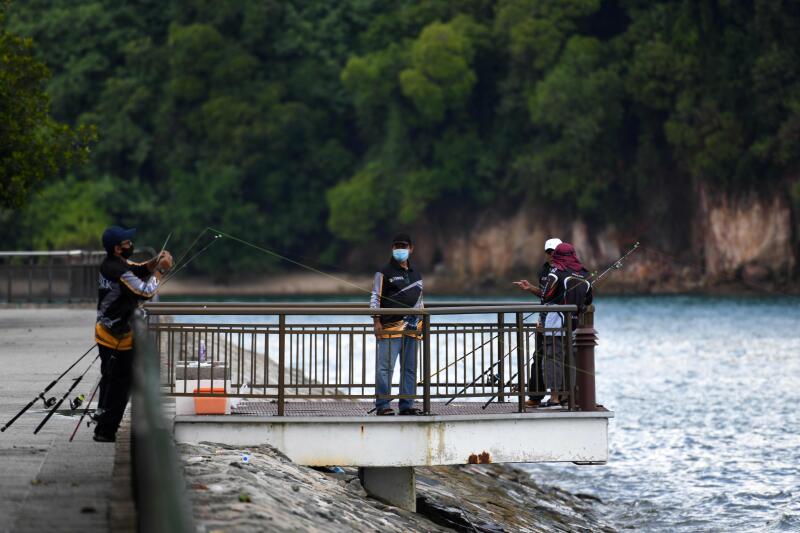Fishing community proposes three sustainable fishing guidelines amid local fishing boom
Sign up now: Get ST's newsletters delivered to your inbox

The community proposes a solution to ensure that the rate at which fish is taken from waters in Singapore remain sustainable.
PHOTO: AFP
SINGAPORE - With travel off the cards, anglers in Singapore are casting their lines in local waters more often, raising concerns whether marine life could be fished out faster than they can reproduce.
Some members of the local fishing community have proposed a solution to ensure that the rate at which fish is taken from waters in Singapore remains sustainable.
Working with conservationists and marine scientists, the Marine Stewards non-profit group has come up with three guidelines for fishermen.
First, juvenile fish should be released so that they are given the chance to grow to maturity and repopulate the sea.
A list of maturity lengths for some 50 species commonly found in Singapore waters, such as the orange-spotted grouper and leopard coral trout, is provided on the group's website.
Second, the critically endangered shovelnose ray - commonly served as shark head in restaurants - should not be taken at all.
Third, anglers should keep hybrid groupers that are caught, Marine Stewards recommends, as this is a non-native species that has the potential to outcompete native fish for food, disrupting the local ecosystem.
"For fishermen, sustainable fishing will allow the sport to flourish and even improve in generations to come," said Ms Sue Ye, founder of Marine Stewards, which was set up in 2019 to promote sustainable fishing.
Ms Ye herself is from the fishing community.
Her company, Singapore Fishing Charter, has seen a 30 per cent increase in monthly bookings since mid-June, when Singapore gradually reopened its economy after a two-month circuit breaker period to stem to spread of Covid-19.
Recreational travel is still not permitted.
Added Ms Ye: "With the increased fishing pressure, the company is committed to ensuring sustainable fishing practices onboard."
Angler Lim Yi Xuan, 19, who has earned a following for his fishing videos on his facepalmfishing YouTube account, said he sees the value of sustainable fishing guidelines.
"As an angler, I feel that the all-take hybrid grouper recommendation would be easily followed by all anglers.
"Most anglers would also accept the recommendation of releasing juveniles as well, as there are anglers who are already practising this now."
But Mr Lim, who is a student, emphasised the importance of a consultative approach between conservationists and the community.
For example, if a shovelnose ray is badly injured after it is fished out from the waters, it may not be practical to release it.
He added: "I feel that we need to trust their judgment on keeping the fish. This will build a mutual trust between Marine Stewards and anglers, who would be more open and willing to follow the guidelines."
National University of Singapore fish scientist Zeehan Jaafar, who had worked with Marine Stewards on the guidelines, said the effort was a good first pass at garnering stakeholder buy-in in the absence of legislation.
But a catch-and-release programme would have to be more comprehensive, citing how there are currently no limits imposed on recreational anglers, which allows them to take species of any size, she said.
Last month, for instance, an 80kg honeycomb whipray - a species vulnerable to extinction - was caught off Bedok Jetty. It was later cut up.
Asked if there was also conservation value in releasing larger, mature fish, Dr Jaafar said: "Yes, because the high reproductive potential of larger individuals is a major factor in ensuring healthy fishery stock."
But she noted that the high diversity of fish in Singapore waters, many of which are also eaten by fishermen, makes it difficult to propose a one-size-fits-all bag limit to control the catch.
"Ideally, this is the direction that we should head towards to conserve fishery stocks in Singapore," she said.
Mr Stephen Beng, chair of the Friends of Marine Park community said that because there are no large-scale fisheries operating in Singapore waters, recreational fishing could have an impact on fish stock here.
"We need to be aware of the potential issues caused by mismanaged recreational fishing... It makes more sense therefore for recreational and sport fishing to be involved in the conservation of our reef and aquatic habitats," said Mr Beng, who added that a balance must be struck between a passion for fishing and sustainability.
The Friends of Marine Park community, which comprise stakeholders such as anglers, boat owners, academics and government agencies, is working on outreach and education programmes, especially for those new to the activity, be it fishing, boating or diving.
Dr Jeffrey Low, senior manager at the coastal and marine division at the National Parks Board's National Biodiversity Centre, said that there are several "no-take" zones in Singapore.
Fishing is not allowed in the Sisters' Islands Marine Park, Sungei Buloh Wetland Reserve, Labrador Nature Reserve rocky shore, Chek Jawa Wetlands, and the waters around Coney Island Park.
"These areas are managed as sanctuaries for the mangrove and marine habitats to flourish and the fish population to grow to maturity," said Dr Low.
For more information on the sustainable fishing guidelines, visit this website.


